Knowledge organisers – Examples, templates and what to avoid

A simple guide to producing the best knowledge organisers for your primary or secondary pupils…

- by Teachwire
- Classroom expertise and free resources for teachers
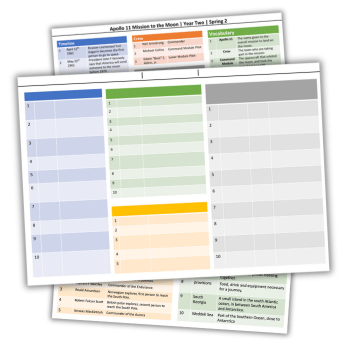
Unlock the full potential of knowledge organisers in your teaching practice. From understanding the basics to integrating them for effective assessment, we cover it all…
What is a knowledge organiser?
Knowledge organisers are documents that contain the core content for a teaching unit. They are the ultimate tool of inclusion. Well-written knowledge organisers allow every child, regardless of their socio-economic status, attendance or previous education to access the core knowledge they need to be successful.
Knowledge organisers have three purposes:
Planning tool – Set out all of the core, foundational facts that children must learn to understand and master a particular topic
Assessment tool – Quickly check that pupils are learning exactly what you hoped they would
Quizzing tool – Help pupils to recall with lightning speed the key information they need to make sense of a topic
Of course, knowledge organisers will never replace an expert at the front of the room, but they are an excellent tool for establishing the foundations needed to be successful.
Knowledge organiser template
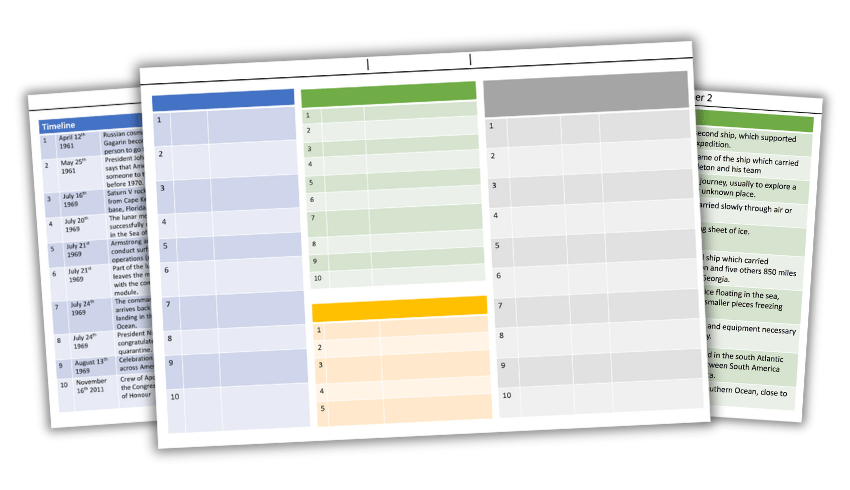
Use this free, blank knowledge organiser template and examples from Jon Hutchinson to create documents for your own classroom. Use the template to chunk information into different sections, such as ‘key vocabulary, ‘important people’ or a ‘timeline’.
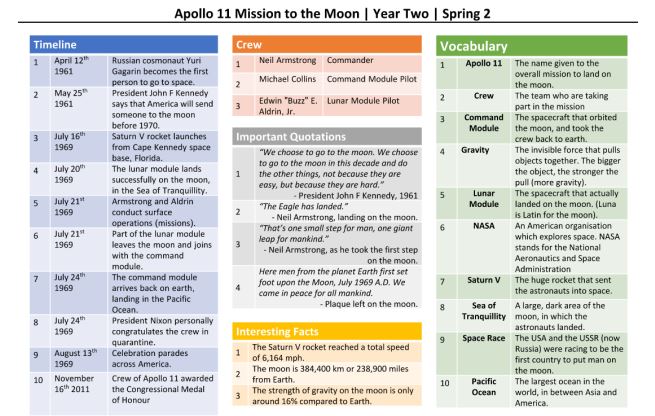
How to create your own knowledge organisers
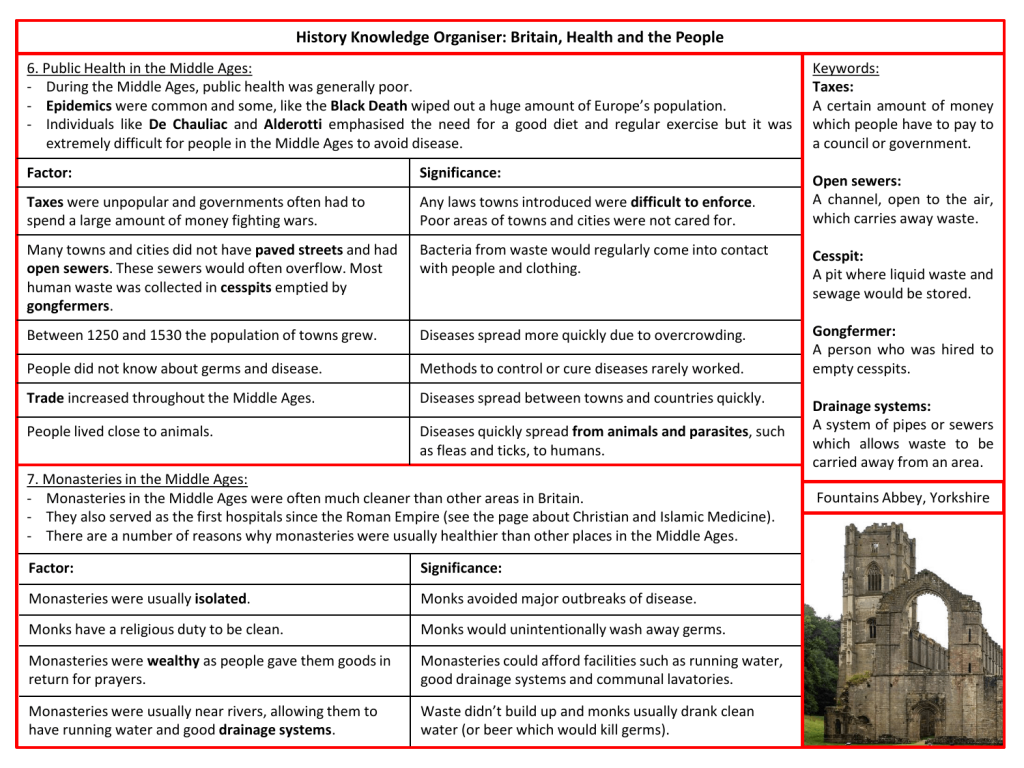
Head of humanities, Becky Sayers, lays out a six-step process for making sure your knowledge organisers are effective…
To have the desired impact, your knowledge organisers need to be well-written. The below six-step method is based on the principle that your knowledge organisers should be:
- focused
- sequential
- accessible
You’ll never achieve perfection, but using this method should dramatically decrease your workload and result in valuable documents which are the linchpin of your curriculum planning.
1) Define the schema
I usually write knowledge organisers at the same time as writing a scheme of work. In order to decide exactly what I’m going to include in my knowledge organiser, I need to know exactly where my scheme of work is going.
Mapping out the core knowledge and concepts also allows me to consider any connections with previous units or links between sub-topics.
This is arguably the most dangerous stage of writing knowledge organisers. As subject specialists, it is often tempting to get carried away and to include interesting titbits and hooks, rather than what is required.
However, the aim of knowledge organisers is to ensure that all pupils have the essential foundational knowledge. Unfortunately, it is more difficult to determine what to leave out, rather than what to include.
“It is often tempting to get carried away and to include interesting titbits and hooks”
2) Sequence the schema
Consider which foundational concepts pupils will need to cover before they can move on to others. This has the added bonus of essentially planning your lesson sequence at the same time.
3) Decide on presentation
One of the core principles behind my knowledge organisers is accessibility for all. As a result, I try to present the information in the easiest way possible.
I use bullet points in my knowledge organisers, trying to stick to a fact per bullet point. I completely avoid paragraphs. I also use tables, diagrams and dual coding wherever possible.
4) Write and trim the sections
Just as with deciding on the schema for a unit, writing knowledge organisers is often a deceptively difficult task. Some of my first knowledge organisers were rushed or lacked a clear schema. As a result, many sections contained vague or superfluous bullet points.
As a result, when pupils wrote quizzes for homework, they often wrote vague and superfluous questions.
Bullet point: “Religion was extremely important in Anglo-Saxon society.”
Q: “What was religion in Anglo-Saxon society?”
A: “Important.”
We ask pupils to write quizzes about sections of the knowledge organisers. I use the same method to quality assure each section. I write the section, leave it for a couple of days then return to it and write quiz questions from it. I write one question per bullet point. The quality of the quiz determines the quality of my writing!
“Writing knowledge organisers is often a deceptively difficult task”
5) Include keywords
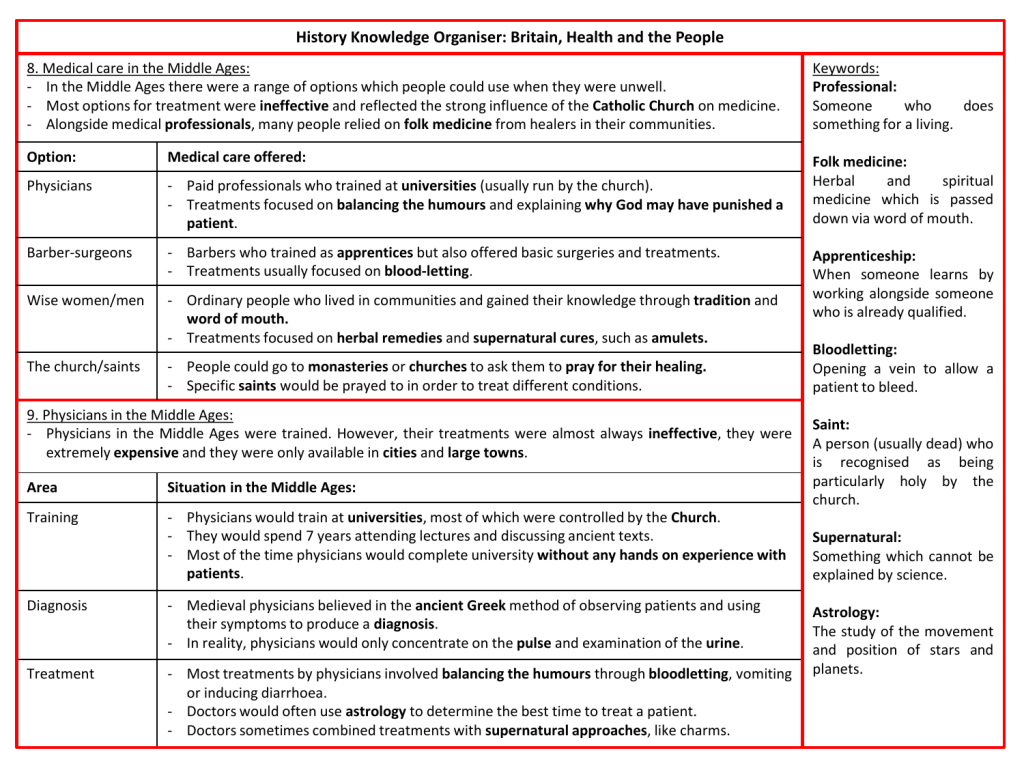
I have keywords on every page. Originally, I had a specific keywords page or a keywords section for every few pages. What I found was that pupils were rarely willing to go hunting for definitions. When faced with a word they were unsure of, many chose simply to avoid it.
6) Administrative steps
It may sound minor, but one of the biggest changes I made to my knowledge organisers when I redrafted them for the first time was adding numbers to each section. I found that asking pupils to write or answer questions about “hard engineering” or “waves” was fraught with confusion or excuses.
By numbering each section, pupils cannot argue that they can’t find the relevant information in the knowledge organiser, and homework can be quickly and easily written into planners.
Becky Sayers is head of humanities at a secondary school in Wiltshire. You can find her at thepassionatelyboringteacher.blogspot.com and follow her on Twitter at @MissSayers1.
Knowledge organiser examples
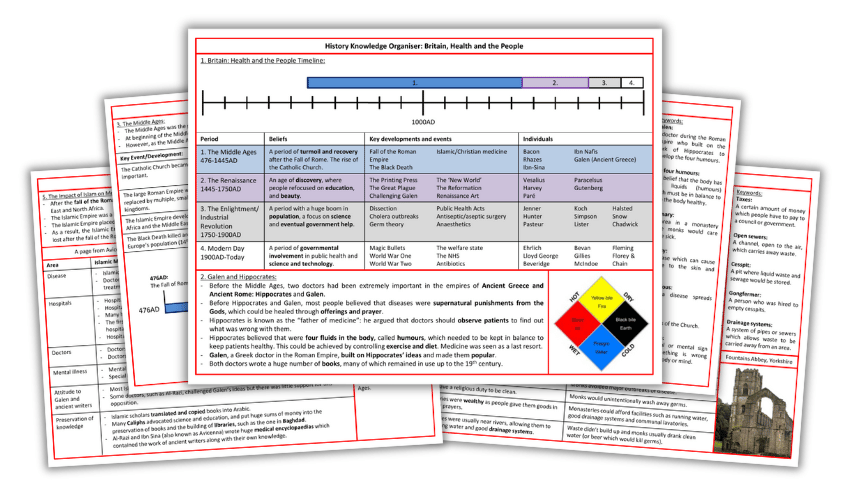
Each section of this 32-page history knowledge organiser from teacher Becky Sayers contains key events and developments, plus their significance, a timeline, keywords and lots of key history knowledge.
WJEC knowledge organisers for GCSE
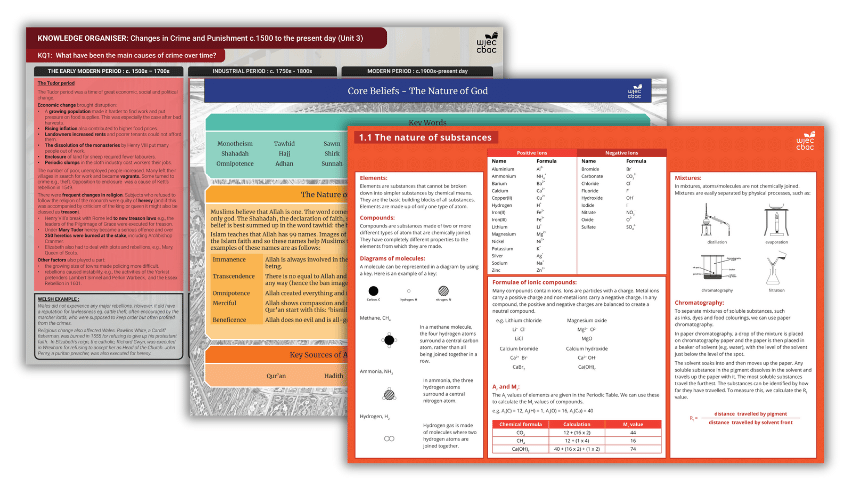
Wales’ largest awarding body, WJEC, has created a collection of sample GCSE knowledge organisers to aid revision or as a starting point for creating your own.
Using knowledge organisers for assessment
Throughout a unit, refer back to your knowledge organiser and ‘check off’ what you have taught in depth during lessons.
Ask pupils to spend a few moments taking it in turns to explain one particular section to their partner, or start each lesson with a ‘pop quiz’ to test what pupils have retained.
Of course, quizzing does not have to be directed by you. Knowledge organisers are perfect tools for ‘self-quizzing’. This means asking pupils to cover up one column on their knowledge organiser (for example the names of the important people in a period) and then see if they can recall these names from their descriptions. Or pupils can try and write out the descriptions you have written based on the names.
“Knowledge organisers are perfect tools for ‘self-quizzing’”
This process of self-quizzing is low-stakes, hugely motivational and has massive learning benefits. It increases what cognitive psychologists Robert and Elizebeth Bjork refer to as retrieval and storage strength of key knowledge.
Known within the literature as the ‘testing effect’, it is one of the most robust findings in psychology, and will set up your students with a powerful studying strategy for the rest of their lives.
Jon Hutchinson is director at the Reach Foundation. Follow him on Twitter at @jon_hutchinson_.
Mistakes to avoid with knowledge organisers
Head of humanities, Becky Sayers, has been using knowledge organisers for several years. Here’s what she wishes she knew at the start…
Introducing knowledge organisers has been a learning curve. If implemented poorly, they can vastly increase workload, have a negligible impact on learning and, in a worst-case scenario, can cause pupils to become overwhelmed and disengaged.
Teacher time is precious, and knowledge organisers take significant time to create. When you write and implement them well, they can be valuable resources which you can use year-on-year.
However, if this isn’t the case, they can become seemingly pointless time-eaters that make teachers resentful. In order to ensure the former, here are four key questions to ask yourself…
“When you write and implement them well, they can be valuable resources”
1) Is the content of the knowledge organiser essential?
I have to admit, I quite enjoy creating knowledge organisers; they can feel like an opportunity to showcase my subject knowledge, particularly when I’m writing about topics which I enjoy or know a lot about.
Unfortunately, this level of enjoyment can also cause knowledge organisers to become bloated.
In the early days, I had a tendency to start writing about what was interesting, rather than what was essential – often finding that the final stage of my drafting process was to remove unnecessary material, rather than to add anything else.
To minimise the need for seemingly endless trimming and redrafting, I now ask myself one question whenever I’m writing facts on a knowledge organiser page: do pupils need to memorise this?
If the answer is no, it probably does not need to be included.
2) Is your department engaged with knowledge organisers?
It is often tempting, as educators, to see ourselves as islands. Throughout my training I was encouraged to develop my own resources. This is a key skill for any teacher.
However, it can create the impression that using colleagues’ resources, even within our own departments, is somehow ‘cheating’ or ‘stealing’.
This, in turn, can result in teachers not engaging with knowledge organisers, either through a habit of self-reliance or a culture of not planning as a team.
This can lead to knowledge organisers not being in line with lessons, causing teachers and students to either feel overwhelmed, or to view the resources as pointless.
Equally, without proper guidance, some teachers can become overly reliant on knowledge organisers. They become a fact sheet which replaces teacher input, or the centrepiece of every lesson.
“Without proper guidance, some teachers can become overly reliant on knowledge organisers”
The result of this approach is that pupils’ knowledge will be extremely shallow, as they have only been given the bare minimum, leaving them unable to make connections or understand the significance of events.
Fully integrated
Knowledge organisers have to be fully integrated within a scheme of work and all teachers of that topic must engage with them. They should be a thread in the tapestry for every teacher, rather than a patch or the entire picture for some.
In our department, we achieve this through a mix of training and homework. At the beginning of each unit, the heads of subject deliver ‘masterclasses’ for teachers on their subjects, explaining the key themes and points within the knowledge organisers.
Even then, our department does not use knowledge organisers in lessons. Rather, our initial input of knowledge is via teachers giving carefully planned explanations which are in line with the knowledge organisers (often building on them).
“Our department does not use knowledge organisers in lessons”
The rest of the lesson is spent checking, explaining and using that knowledge. For homework, pupils reinforce their knowledge by either answering centrally planned questions based on sections of their knowledge organiser in their quiz books, or testing themselves on previous quizzes from memory.
3) Are pupils engaging with knowledge organisers?
When I first started using knowledge organisers, I set homework which most pupils were extremely happy with (on the surface): ‘Learn the knowledge organiser page about [topic].’
It was ineffective. Almost all students either diligently read and highlighted the sheet only to become frustrated and disengaged when they found that couldn’t remember what they had read, or, as they were not expected to provide any proof, they didn’t bother to read it at all.
Pupils tend not to recognise the value of homework. Research shows us that novices often cannot differentiate between activities which they find easy and activities which are effective.
If you give pupils knowledge organiser with little instruction other than to ‘learn’ it, the majority will opt for ineffective methods or will not bother at all.
The methods we use as a department, such as quizzing and interleaving, ensure that pupils are accountable, while also ensuring retention through strategies supported by cognitive science.
4 | What barriers might pupils face when using knowledge organisers?
In the past, common reasons for not doing knowledge organiser homework were usually “I didn’t understand it” or “I didn’t have the sheet”.
If knowledge organisers are to be effective, you must tackle these two reasons. The resources must, therefore, be academically and logistically accessible to as many of the targeted pupils as possible.
““I didn’t have the knowledge organiser” is not an excuse for incomplete homework”
Academic accessibility is ensuring that, as much as possible, learners can understand knowledge organisers independently.
When writing ours, we attempt to cater for this by including keywords on each page (so pupils do not have to hunt for definitions). We also avoid ‘chains of definitions’ in our keywords sections and use diagrams whenever possible to complement definitions.
Meanwhile, in our department, “I didn’t have the knowledge organiser” is not an excuse for incomplete homework. This is how we tackle it:
- Pupils have a week to complete the task
- Staff have access to the knowledge organisers (which we save according to common headings on the staff system) so they can print replacements
- We upload all knowledge organisers onto the school website
- We give pupils a paper copy at the beginning of each unit










